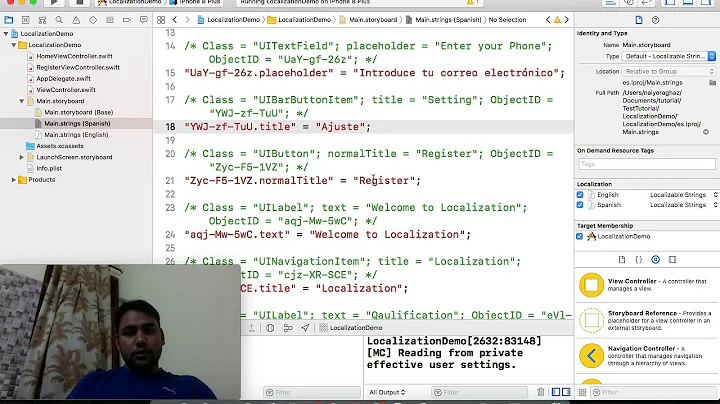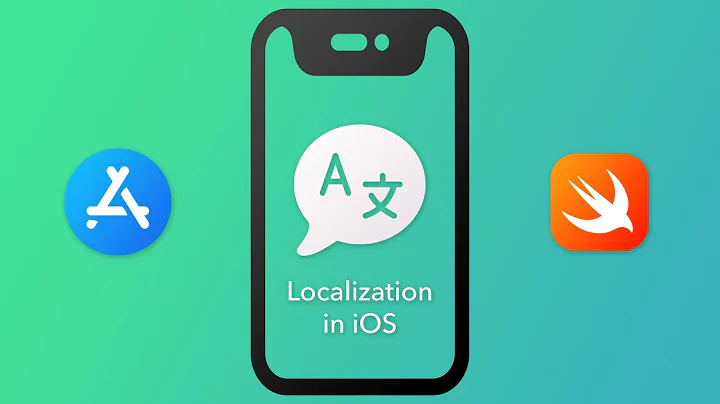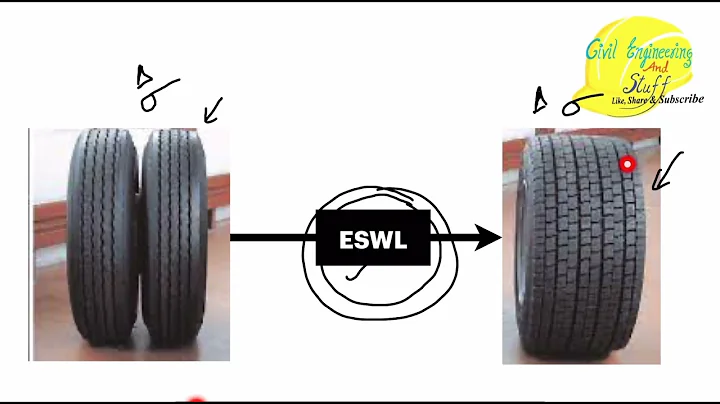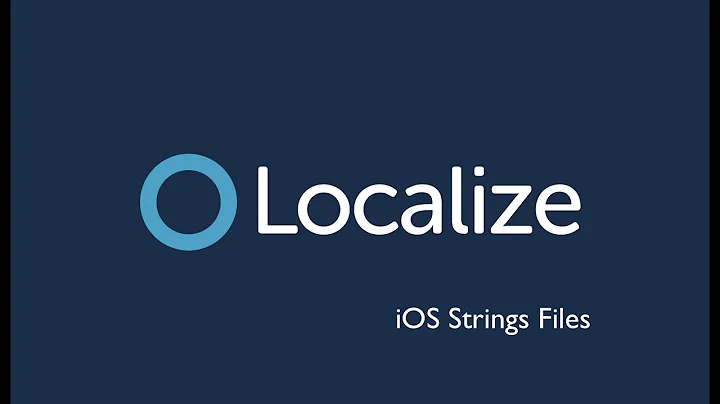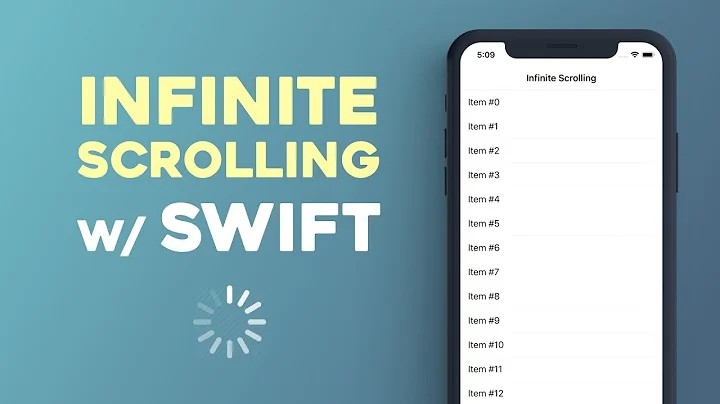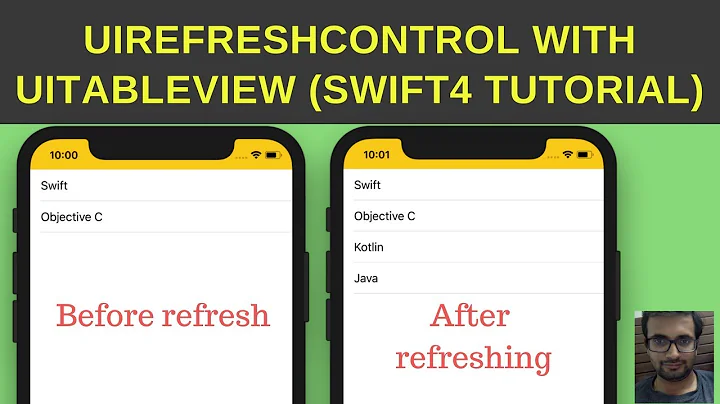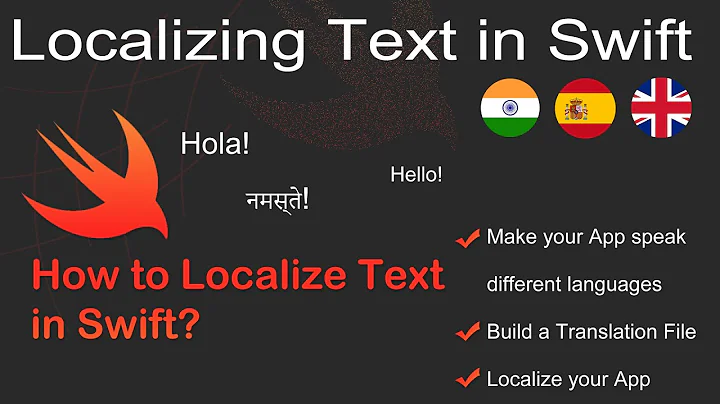What's NSLocalizedString equivalent in Swift?
Solution 1
The NSLocalizedString exists also in the Swift's world.
func NSLocalizedString(
key: String,
tableName: String? = default,
bundle: NSBundle = default,
value: String = default,
#comment: String) -> String
The tableName, bundle, and value parameters are marked with a default keyword which means we can omit these parameters while calling the function. In this case, their default values will be used.
This leads to a conclusion that the method call can be simplified to:
NSLocalizedString("key", comment: "comment")
Swift 5 - no change, still works like that.
Solution 2
I use next solution:
1) create extension:
extension String {
var localized: String {
return NSLocalizedString(self, tableName: nil, bundle: Bundle.main, value: "", comment: "")
}
}
2) in Localizable.strings file:
"Hi" = "Привет";
3) example of use:
myLabel.text = "Hi".localized
enjoy! ;)
--upd:--
for case with comments you can use this solution:
1) Extension:
extension String {
func localized(withComment:String) -> String {
return NSLocalizedString(self, tableName: nil, bundle: Bundle.main, value: "", comment: withComment)
}
}
2) in .strings file:
/* with !!! */
"Hi" = "Привет!!!";
3) using:
myLabel.text = "Hi".localized(withComment: "with !!!")
Solution 3
A variation of the existing answers:
Swift 5.1:
extension String {
func localized(withComment comment: String? = nil) -> String {
return NSLocalizedString(self, comment: comment ?? "")
}
}
You can then simply use it with or without comment:
"Goodbye".localized()
"Hello".localized(withComment: "Simple greeting")
Please note that genstrings won't work with this solution.
Solution 4
By using this way its possible to create a different implementation for different types (i.e. Int or custom classes like CurrencyUnit, ...). Its also possible to scan for this method invoke using the genstrings utility. Simply add the routine flag to the command
genstrings MyCoolApp/Views/SomeView.swift -s localize -o .
extension:
import UIKit
extension String {
public static func localize(key: String, comment: String) -> String {
return NSLocalizedString(key, comment: comment)
}
}
usage:
String.localize("foo.bar", comment: "Foo Bar Comment :)")
Solution 5
Swift 3 version :)...
import Foundation
extension String {
var localized: String {
return NSLocalizedString(self, tableName: nil, bundle: Bundle.main, value: "", comment: "")
}
}
Related videos on Youtube
Rafał Sroka
sSSSs SSSSSSS SSSSSSS SSSSS .--' '--. / \ / | | \ / / \ : / \ \ ( ( ) : ( ) ) \ \ / \ / / _`\/ . \/`_____ /~~; ;~~~~~/| / '.__|__.' _/ /__________________/ | |
Updated on July 18, 2022Comments
-
 Rafał Sroka almost 2 years
Rafał Sroka almost 2 yearsIs there an Swift equivalent of
NSLocalizedString(...)? InObjective-C, we usually use:NSString *string = NSLocalizedString(@"key", @"comment");How can I achieve the same in Swift? I found a function:
func NSLocalizedString( key: String, tableName: String? = default, bundle: NSBundle = default, value: String = default, #comment: String) -> StringHowever, it is very long and not convenient at all.
-
 Matej Ukmar almost 9 yearsBest is to create shorter version of code snippet: NSLocalizedString("", comment: "") ... I liked the extension solution, but the problem is genstrings will not capture these strings into translation file.
Matej Ukmar almost 9 yearsBest is to create shorter version of code snippet: NSLocalizedString("", comment: "") ... I liked the extension solution, but the problem is genstrings will not capture these strings into translation file. -
LShi about 7 yearsIn Swift 3 you can just use
NSLocalizedString("Cancel", comment: "Cancel button title")taking advantage of the default values. It is convenient I think. -
LightMan almost 6 yearsThis is a very good article about localization (string extension, different strings tables and even pluralization): medium.com/@marcosantadev/…
-
 Mendy about 5 yearsThis is a very good article about localization in Swift for a robust architecture medium.com/@mendibarouk/…
Mendy about 5 yearsThis is a very good article about localization in Swift for a robust architecture medium.com/@mendibarouk/…
-
-
Marcin over 9 yearsit's only difference that comment can't be nil, and autocompletion is far from intuitive for short version.
-
Apps 4 U over 9 yearsthis is not working any more I get error saying that not enough arguments are used.
-
Neil about 9 yearsNot that the above is correct in Xcode 6.3, Swift 1.2 with the specific change from objective-c, the comment (as Marcin stated) cannot be nil, but it can be "" (empty).
-
Avi Cohen about 9 years@drOX You might consider editing your code to:
return NSLocalizedString(self, comment: self) -
Ned about 9 yearsThe only issue with this is that you won't be able to use the
genstringsutility to generate your .strings files. -
 dr OX almost 9 years@AviCohen q.v. after "upd"
dr OX almost 9 years@AviCohen q.v. after "upd" -
Gui Moura almost 9 yearsThat's a very good idea! I also made it a little bit smarter by changing to
func localized(comment: String = "") -> Stringso it becomes smaller and with optional comments :) -
Chris over 8 yearsAny idea how to use
genstringswith this? -
 Joney Spark over 8 yearsA nil/empty comment makes it hard to relocate the string later in the string file; if nothing else add class/file name where it's used as the comment.
Joney Spark over 8 yearsA nil/empty comment makes it hard to relocate the string later in the string file; if nothing else add class/file name where it's used as the comment. -
Pascal over 8 yearswhere would you put such a snippet in the project?
-
Erik van der Neut about 8 yearsEverybody is very excited about this answer, but the BIG problem (for any serious project with several languages) is that this completely messes up your management of your translated messages, because
genstringsonly works on literal strings passed in to NSLocalizedString. With this clever workaround, you lose the ability to update your .strings files using thegenstringstool, and at least for me that means I will not be able to use this simplified approach. -
Tomek Cejner about 8 yearsI found this great solution implemented in github.com/marmelroy/Localize-Swift. Problem of genstrings is also resolved by custom python script included by the author. I am not an author.
-
Jeremiah almost 8 yearsThis is bad practice. Comments are recommended and helpful unless you are doing all of the translation yourself.
-
Ken Ko over 7 yearsSimilar to the comment on
genstrings- it will also mess up the built-in Xcode XLIFF export/import process too, because that tool is also a lexical parser of source code, and won't know how to export the strings anymore. -
 David James over 7 yearsI don't understand why people think this is a good answer? What is the point of using localization API at all (even with the extension) if you can't export/import it properly via Xcode for translation???
David James over 7 yearsI don't understand why people think this is a good answer? What is the point of using localization API at all (even with the extension) if you can't export/import it properly via Xcode for translation??? -
 guido over 7 yearsFor those that like/need the xcode import/export feature, I created a little AppleScript that puts the NSLocalizedString function around the string you select. I linked it to a shortcut key. Simply select the string you want to localise and hit the shortcut key. This was not my idea. Got it from somewhere on the internet, but can't remember where, sorry. Here's the script:
guido over 7 yearsFor those that like/need the xcode import/export feature, I created a little AppleScript that puts the NSLocalizedString function around the string you select. I linked it to a shortcut key. Simply select the string you want to localise and hit the shortcut key. This was not my idea. Got it from somewhere on the internet, but can't remember where, sorry. Here's the script:on run {input, parameters} set new_text to "NSLocalizedString(" & input & ",comment:\"translatorComment\")" return new_text end run -
Cristian Cardoso over 7 yearsSwift 3. bundle: Bundle.main
-
LShi about 7 yearsSorry I don't get the point of many answers here. What's the benefit of the method over using
NSLocalizedString("Cancel", comment: "Cancel button title")? -
GYFK about 7 years@LShi some people were complaining, that
NSLocalizedStringlooks less Swiftier, than it should look.String.localizedon the other hand looks more Swifty but you are unable to usegesntringsutility with it which is commonly used to ease your work with internationalization. My point is that it`s pretty easy to mix both approaches. So mainly it is a question of readability. -
iDevAmit almost 7 yearsThe thing to note is that Strings defined in the described way are static strings. The app should be relaunched after changing language in iOS Settings app. If not, relaunch it by yourself in order to see changes. It can also have a memory overhead, since we initialize all strings at once, not at the time they’re needed.
-
May Phyu almost 7 years@drOX , Bro could you help me please stackoverflow.com/questions/44304498/… ?
-
damianostre almost 7 years@guido How do you make the Applescript available in Xcode? Via Services? And what shortcut did you set up? In Xcode's Preferences, or in System Preferences, or where?
-
 guido almost 7 yearsI set it up system wide. It's available through services, but it always use my shortcut key: cmd-shift-F12
guido almost 7 yearsI set it up system wide. It's available through services, but it always use my shortcut key: cmd-shift-F12 -
 art-of-dreams over 6 yearsI think it's better to use computed properties here, like this
art-of-dreams over 6 yearsI think it's better to use computed properties here, like thisstatic var Hello: String = { return NSLocalizedString("Hello") } -
José about 6 yearsIt is bad practice to leave out the comments.
-
 GatoCurioso about 6 years@José Thanks for your comment. The code was meant as an idea, not as template for copy and paste. But I added the option to add comments if you want ;)
GatoCurioso about 6 years@José Thanks for your comment. The code was meant as an idea, not as template for copy and paste. But I added the option to add comments if you want ;) -
 shim over 5 yearsEven if you're translating yourself, the comments would be helpful, especially in a large project.
shim over 5 yearsEven if you're translating yourself, the comments would be helpful, especially in a large project. -
BangOperator over 5 years@Warpzit Just out of curiosity, how do you collect all your strings that need to be localised.
-
Warpzit over 5 years@BangOperator Well right now we have a script that converts a csv file to the localized files. We're planning to transition to one of the online tools that can manage all translations on multiple platforms. In other words, we wont be importing or exporting any translations from xcode, we'll simply just override the files.
-
 Cristik over 4 yearsDownvoted because it doesn't follow the Swift naming guidelines
Cristik over 4 yearsDownvoted because it doesn't follow the Swift naming guidelines -
 Cristik over 4 yearsWhat happens if you need to do another round of
Cristik over 4 yearsWhat happens if you need to do another round ofgenstrings? Do you replace back all.localizedbyNSLocalizedString? -
Christian Gossain over 4 yearsThis answer is amazing and should be upvoted more! This is the simplest solution I've found so far if you're looking to avoid bringing in yet another library. This is a good native solution.
-
Wimukthi Rajapaksha about 4 years
extension String { func localized(withComment:String, table_name: String?) -> String { return NSLocalizedString(self, tableName: table_name, bundle: Bundle.main, value: "", comment: withComment) } }if you use this code, default it will check the string in Localizable.strings file. And if you want to check in another file, you can pass the file name in parameters,let contentHelloWorld = "hello_world".localized(withComment: "hello", table_name: "Localizable-SP") -
Ethan Allen almost 4 yearsThis is the correct answer. Once Apple does update it for Swift, Xcode will be able to just auto-convert this API to its new Swift API and nothing else will break. Even in Xcode's Refractor menu currently (v 11.4.1) there is a
Wrap in NSLocalizedStringoption which make things really easy by just highlighting text, right-clicking, and selecting the menu item. -
 arlomedia over 3 yearsI use a translation database that has a place for comments, and have no need for these comments or the empty "comment:" arguments to be in my code. So I'm using this, plus an underscore before the "key:" argument, to make the function calls even cleaner.
arlomedia over 3 yearsI use a translation database that has a place for comments, and have no need for these comments or the empty "comment:" arguments to be in my code. So I'm using this, plus an underscore before the "key:" argument, to make the function calls even cleaner. -
Ethan Allen almost 3 yearsThis is perfect for realtime
Info.plistuser defined build settings translation when using multiple Xcode Schemes. Thanks! -
devjme over 2 yearsThis also worked for me but instead of a signaling a . at the end for current dir I had to add the actual folder to the genstrings command like this: genstrings MyCoolApp/Views/SomeView.swift -s localize -o en.lproj

